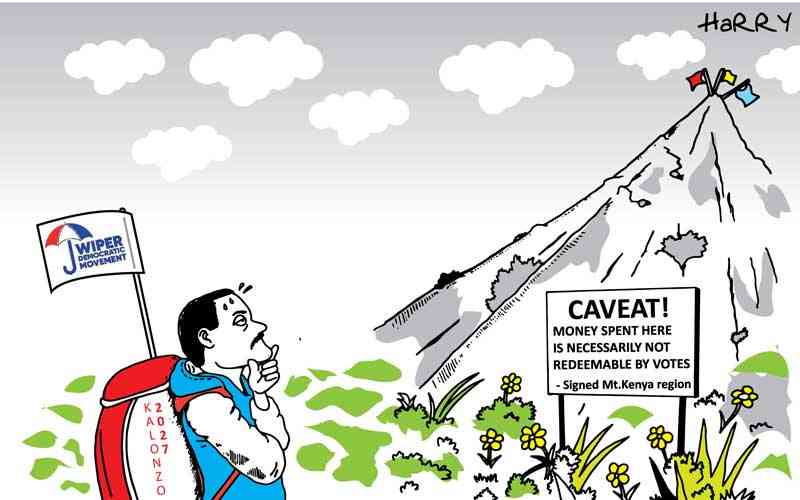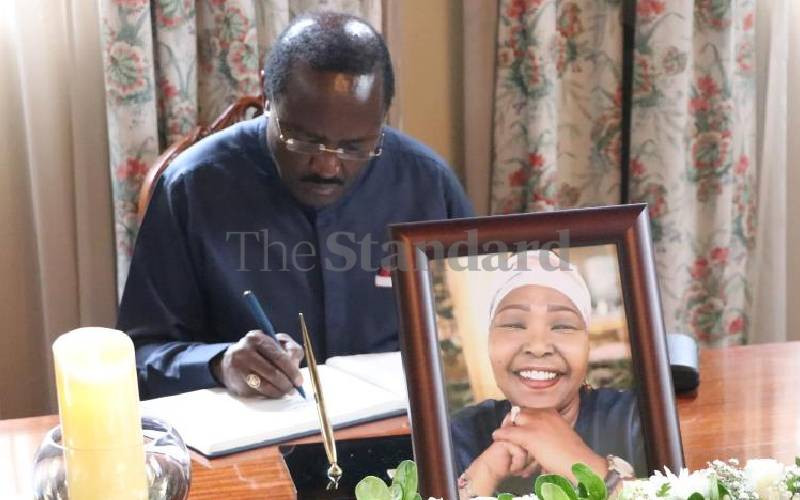There were two interesting happenings over the last weekend at places located far apart – one in the peace valley, the other in Ukambani – that seemed to have many coincidental similarities.
We are talking about the duel between Deputy President William Ruto and his namesake, Bomet Governor Isaac Ruto on one hand and the duel of the immediate former Vice-President Kalonzo Musyoka and Machakos Governor Alfred Mutua.
There were at least two coincidences: a) It involved a former ‘vice president’ and a ‘deputy president’ staking a claim at regional supremacy; b) The other party was a governor and key member of the party.
They happened last weekend with video clips doing rounds on the social media, leaving the citizenry somewhat divided on who they support.
Some of the reasons for the clash are partly press-generated, a not-so -well informed opinion that so-and-so wants to oust the other from being the regional king pin.
Whatever the reasons, each protagonist seems honestly bent that their view or ideology, if any, is right.
Governor Ruto seems to believe ‘more devolution’ may be the solution to issues that ail the economy, while the DP’s view is uncertain, like in most issues, but he is definitely projecting a big man’s syndrome.
The chap-chap movement in Ukambani has similar divergence with the party leader.
There could be other views that are not shared, but this is what I see and seems apparent to all who would want to accept that something is a-miss.
For the time being, at least, it has not reached a point of suspension as happened to William Ruto while serving in the Cabinet under the ODM party. Otherwise, the two governors would be in a ‘hotbed’ of suspension from their respective political parties!
The problem seems to lie at the definition and organisation of political parties.
The high ideals in the political parties Act as to what a political party is remain for the rule book.
In reality – on the ground - a political party in Kenya is a tribe conglomerating around one of their ‘own’ to win national office, or at least to negotiate for such an office.
This is what President Obama spoke about at Kasarani Stadium when he said “a politics that’s based solely on tribe and ethnicity is a politics that’s doomed to tear a country apart”.
We do not respect institutions as established by law so that the strong man mentality is not allowed to prosper. It is a failure of imagination and free thought process. This is what is afflicting all political parties in Kenya.
Stay informed. Subscribe to our newsletter
The leaders of such parties suffer the same fate of a hidden ‘strong-man’ mentality that, if they assume power, shall immediately manifest or sprout and with time, gain astounding proportions.
They start innocently but become monsters over time.
Vilifying Dr Mutua for trying to rewrite the tribal politics with an economic script does not seem right.
It could be the blueprint that will transform our ‘poverty’. Or is it that the Nyayo era political creed that chama iko na wenyewe (a party has its owners) is still holding true? It makes politics so predictable, tasteless and uneventful.
Respect for institutions like the courts, political parties, Chapter 15 commissions in the Constitution of Kenya 2010, will create certain and enjoyable co-existence in Kenya and no opportunity to grow ‘strongmen’.
Our leaders surely should be able to accommodate divergence of opinions within the parties, otherwise ours is not a democracy.
Politics is a market place of ideas. The best ideas will take the nation forward. This is the theory why ‘freedom of speech’ is a fundamental right.
Respect for courts is not out of convenience but real politic. There is need for exhaustion of remedies as that provides order in a given situation.
This is brought to doubt by the utterances of some not-so-informed politicians across the nation when they advise the Deputy President to skip The Hague Court process.
The exhaustion of remedies is not anywhere in sight and I believe that the Ruto/Sang cases have progressed fairly well that to imagine the worst for the duo is foolhardy.
The other trajectory that brings out lack of respect for institutions is the Knut/TSC case.
The parties are yet to milk dry the tree of due process but the Knut members are engaging in a strike that has the potential of hurting children in public schools.
The strike by the teachers is premature. They should not get out of the reasonable route of due process. Public funds must be accessed by a due process.
What if the teachers were to fail finally, how will they respond to a recovery process? It can happen to the chagrin of those clamouring for payments now.
 The Standard Group Plc is a
multi-media organization with investments in media platforms spanning newspaper
print operations, television, radio broadcasting, digital and online services. The
Standard Group is recognized as a leading multi-media house in Kenya with a key
influence in matters of national and international interest.
The Standard Group Plc is a
multi-media organization with investments in media platforms spanning newspaper
print operations, television, radio broadcasting, digital and online services. The
Standard Group is recognized as a leading multi-media house in Kenya with a key
influence in matters of national and international interest.
 The Standard Group Plc is a
multi-media organization with investments in media platforms spanning newspaper
print operations, television, radio broadcasting, digital and online services. The
Standard Group is recognized as a leading multi-media house in Kenya with a key
influence in matters of national and international interest.
The Standard Group Plc is a
multi-media organization with investments in media platforms spanning newspaper
print operations, television, radio broadcasting, digital and online services. The
Standard Group is recognized as a leading multi-media house in Kenya with a key
influence in matters of national and international interest.








